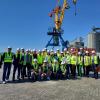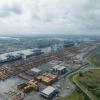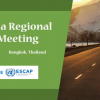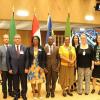News
Displaying Results 126 - 150 of 1293
Every year, forest fires set new records. The 2023 wildfire season in the Northern Hemisphere could not have been worse.
The wildfire that ravaged northeastern Greece in August was the largest single wildfire recorded in the European Union (EU), burning more than 810 square kilometres.
In the…
Sound emission inventories are the first step for designing effective clean air policies as they provide information about the main sources and the most acute air pollution problems in a country.
Under the Convention on Long-range Transboundary Air Pollution (Air Convention), UNECE has therefore…
Since 2009 when Public-Private Partnerships (PPPs) were introduced in Kyrgyzstan, 66 projects have been implemented in the country, providing access to critical public services to more than 1 million citizens. These PPP projects are the driving forces of the economic and social development in…
Decades of unsustainable consumption and production patterns have resulted in the exhaustion of finite resources and environmental degradation. As governments reassess scenarios, the circular economy model - where resources are reused, recycled, and repurposed to reduce waste - has become a pillar…
In the Drina River Basin, shared mainly by Bosnia and Herzegovina, Montenegro and Serbia, working together across borders and jointly addressing water and energy challenges is a key part of effective climate action and the green transition.
As part of the Sarajevo Energy and Climate Week (25-29…
Many incidents in freight transport are attributed to poor practices in the packing of freight containers, including inadequate securing of cargo, overloading and incorrect declaration of contents. The victims of these incidents may be the general public or transport and supply chain workers, who…
The Republic of Moldova is almost entirely dependent on energy imports as it has no domestic sources of fossil fuels and makes only limited use of its renewable energy potential. At the same time, the energy intensity in the country is 3.4 times higher than the average energy intensity in the…
UNECE mission to Ukraine helps prepare for urban rebuilding efforts under UN4UkrainianCities project
The war in Ukraine has left nearly 1.5 million homes destroyed, with a staggering $411 billion needed for reconstruction and recovery. A recent Human Impact Assessment (HIA) reveals that 65% of households have seen a decline in income since February 2022. It is imperative now to work towards…
Taking up some of the main results of the recent review report, which assessed the effectiveness of the amended Protocol to Abate Acidification, Eutrophication and Ground-Level Ozone (Gothenburg Protocol) under the UNECE Convention on Long-range Transboundary Air Pollution, experts discussed…
Bosnia and Herzegovina and Serbia are in the process of adopting road safety strategies and actions plans that rely on modern tools. In both countries, road safety audit and road safety inspection are recognized by legislation, but in-depth analysis of road crashes is still not part of the…
The building industry currently accounts for 39% of global energy-related CO2 emissions, 11% of which result from manufacturing building materials and products such as steel, cement, and glass. And yet, to date, emission reduction efforts have not really focused on decarbonizing the construction…
The results of the recent review report, which assessed the effectiveness of the amended Protocol to Abate Acidification, Eutrophication and Ground-Level Ozone (Gothenburg Protocol) under the UNECE Convention on Long-range Transboundary Air Pollution, have triggered further discussions among…
Breathing clean air is a necessity for everyone and decent air quality is a shared responsibility that can only be achieved if we work together. This is what Member States in the UNECE region realized 45 years ago, when they started negotiating the first multilateral, legally binding treaty to cut…
A high-level meeting to review the progress of the Vienna Programme of Action for Landlocked Developing Countries (VPoA) in Europe and Asia is kicking off in Bangkok.
Over the course of two days (22 - 23 August), senior United Nations and government officials, representatives from transit…
In today's data-driven world, organizations face the challenge of efficiently integrating and making sense of vast amounts of diverse data. Semantics and semantic interoperability provide a solution by enabling the meaningful interpretation and integration of data across heterogeneous systems. To…
The public and civil society have a crucial role to play in tackling key environmental challenges. To make the most of this potential, continued efforts are needed to uphold their rights to shape environmental decision-making.
To this end, the Working Group of the Parties to the Convention on…
UNECE and partners have started implementation of a multi-year project on “Improving the energy efficiency of the global building supply chain industry and its products to deliver high performance buildings” (full project budget EUR 19.8 million), funded by the International Climate Initiative (IKI…
As one of the United Nations regional economic commissions, UNECE has a key role to play in helping countries with economies in transition to better integrate into the global economy. UNECE is at the forefront of setting international standards on cross-border procedures, identifying regulatory and…
Bringing together countries to share progress and experience on how to effectively manage their shared waters is a key characteristic of the Water Convention. Cooperation for the management of transboundary waters to promote sustainability, peace and security is the Convention’s mantra - especially…
Countries along the middle corridor that connects Central Asia with Europe have agreed on concrete next steps to accelerate the interconnection of their national customs systems with the eTIR international system in an effort to digitalize transit in the region.
At a recent TIR Executive Board…
The Norwegian Government has issued a Mineral Strategy which necessitates the Geological Survey of Norway to produce an inventory aligned with the United Nations Framework Classification for Resources (UNFC).
UNFC will be crucial in this strategy as it will be used to classify mineral resources…
While underground coal mining in Albania stopped almost wholly (except for two private mines with a very insignificant output) more than 15 years ago, the abandonment of the mines from the 1990s onwards with no proper plans for closure has left a legacy of risks. These include water contamination,…
Since September 2022, as part of “The Sustainability Pledge” initiative, UNECE has been working with fashion company Stella McCartney and its Cotton supplier SÖKTAS to trace a T-shirt made of jersey fabric through documentary evidence.
The UNECE blockchain platform allows to capture all actors…
Central Asian countries are actively working towards improving access to water and sanitation. Despite recent progress, Kazakhstan's aging infrastructure, lack of human resources and financial constraints still limit the access of rural population to improved water and sanitation services. In 2022…
UNECE presented its innovation policy insights during the Small Business Act for Europe (SBA) stakeholder meeting at the Organisation for Economic Cooperation and Development (OECD) on 19 June 2023 in Paris. This meeting was a platform for experts on small and medium enterprises (SME) policy,…























